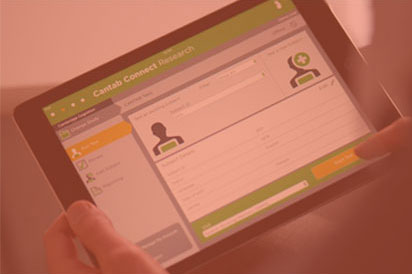Cambridge Cognition Holdings plc (LON: COG), which develops and markets digital solutions to assess brain health, announced today its unaudited Interim Results for the six months ended 30 June 2019.
As announced in the trading update on 27 August 2019, the first half of 2019 generated lower sales than expected, but there was solid growth in the Company’s order book and strong progress with new digital and voice-based solutions, which further strengthens the Company’s position for the medium-term. In H1, sales were lower in the core clinical trials business due to short-term market factors, including a merger of two large customers leading to delays in finalising contracts, reduction in safety testing of two drug classes, and a dip in trial initiations for Alzheimer’s drugs. The quality of our core technology and the scale of our order book gives us much confidence in the future growth of the Company.
Financial Highlights
· Revenue of £2.17 million (H1 2018: £2.75 million)
· Loss before tax of £1.74 million (H1 2018: £1.02 million loss)
· Loss per share of 7.7 pence per share (H1 2018: loss of 5.0 pence per share)
· Cash balance of £2.06 million at 30 June 2019 (31 December 2018: £1.11 million)
Operational Highlights
· Contracted order book of £6.34 million (31 December 2018: £6.08 million, 30 June 2018: £5.95 million, £4.01 million 31 December 2017)
· Major digital solution contract win of £1.3 million in March 2019
· Considerable commercial and scientific advances with the NeurovocalixTM voice-based platform
· Development of electronic Clinical Outcomes Assessment (eCOA) upsell for existing clients
· Commercial team realigned to drive the core clinical trials business and digital health
· Expenditure is being managed to match orders and forecast cash-flow; operational efficiencies were put in place as a result of a business review and further efficiencies are planned
· R&D spend of £0.89 million (H1 2018: £0.71 million) following fund raising
Commenting on the results, Matthew Stork, Chief Executive Officer of Cambridge Cognition, said:
“As announced in our trading update on 27 August 2019, trading in the core business in H1 has been challenging. However, R&D investment in recent years has helped deliver first half successes across a number of areas. Following a recent strategic review, conducted since I joined the Company in March 2019, we have refocused on the high-value clinical trials market, concentrating on sales of CANTAB™ with eCOA add-on sales and digital and voice-based cognitive assessment solutions. The strengths of the Company in providing biomarkers and supporting clinical trials for central nervous systems disorders puts us in a great position to thrive in the growing digital market.”
CHIEF EXECUTIVE OFFICER’S REVIEW
In the first half of 2019 the Company has continued to make demonstrable progress in positioning itself in growth markets: the electronic Clinical Outcomes Assessment (eCOA) and the digital health markets. These advances included major contract wins from digital solutions and the voice testing platform in the period, which contributed to the growing order book of £6.34 million at 30 June 2019 (30 June 2018: £5.95 million).
However, trading in other parts of the business has been challenging. This has led to a decline in overall revenues and a loss for the period which is detailed below. The first half performance is reflected in a lower than expected outturn for the year with expected revenues for the year ending 31 December 2019 in the region of £5.50 million (2018 full year: £6.13 million) and a loss for the year in the region of £2.80 million (2018 full year: £1.44 million loss).
Lower sales in the core clinical trials business has been due to several short-term market factors. These include:
· The merger of two existing large pharmaceutical customers resulting in the continued postponement of large clinical trial contracts from the merging companies as they rationalise their R&D pipelines;
· A reduction in the number of trials being initiated to test cognitive safety in cardiovascular and pain medication programmes, which are market sectors where the Company has achieved significant commercial success in recent years. The Company had already switched its focus to different drug classes for safety testing but revenues will take time to build in these new segments; and
· A slowdown in large later-stage clinical trials for drugs for Alzheimer’s disease following several high-profile clinical trial failures. This commercial opportunity is expected to renew in the medium term as the number of drugs in early stages of development has increased.
At the beginning of 2019, the Company stated its intention to invest in R&D and commercialisation of a broader eCOA platform and digital cognitive solutions. A recent strategic review confirmed that these, together with the NeurovocalixTM voice testing platform, are priority areas for sustainable, license-based revenues and long-term growth. These have progressed well with recent implementation of new contracts with major pharmaceutical companies that include voice-based cognitive assessments and data collection from wearables.
Operational highlights
Overall, there has been an increase in the value of our contracted order book as at 30 June 2019. This now stands at £6.34 million in comparison to £6.08 million as at 31 December 2018 and £5.95 million as at 30 June 2018. It is also notable that this figure was £4.01 million at 31 December 2017. This contracted order book represents sales that we have made but have not yet recognised as revenue and is a good indicator of the future health of the business.
The challenging area in the first half has been sales of the core range of CANTAB™ assessments for clinical trials. The Company has refocused the sales team’s efforts in this area, identifying new prospective customers for both cognitive safety and efficacy testing. There has been an associated improvement in the funnel for prospective orders.
The Company has continued to develop technological and organisational capabilities to provide more widespread eCOA offerings, such as standard questionnaires and scales often used at the same time as the core CANTAB™ assessments. Market research reports for the sector estimate that the eCOA market is sized at c. US$1 billion, growing at 17% per annum. The Company focuses on clinical trials for central nervous systems disorders, which represent 13% of all drug development activities. This also has the potential to generate high margin revenues because, once established, it will require limited ongoing costs to support.
While we have had an international reach for some time, we are now seeing more meaningful incursions into growth economies such as China and India for our core product offering. Whilst this inevitably requires some investment of both cash and people resources, this improved geographical diversity sits well alongside our increasing product diversity to give us expanded market reach in the future.
As the Company continues to work with various customers and partners in the Digital Health arena, which is a substantial opportunity for the Company’s technology. Most major pharmaceutical companies are investing heavily in digital solutions, either to conduct near-patient daily assessments to assess drug efficacy in clinical trials or to provide patients with better care with digital aids. The Company is a pioneer in this field in central nervous systems disorders, having conducted studies using an Apple Watch app three years ago. The experience from this and more recent clinical trials means that the company has excellent know-how that is sought after by major pharmaceutical companies.
There is a considerable amount of experimentation in the field at present and this is currently leading to some increased costs of delivery as the various building blocks are developed – often with specialist third party assistance – for the first time. As these solutions become more widely used and more standardised, it is expected that both revenues and margins on these products will increase.
There has been exciting progress with our NeurovocalixTM voice-based assessment solution in the period. NeurovocalixTM is a platform that can automatically administer voice-based health assessments and conduct machine learning analysis of the results. Following its launch last year, the Company has completed a sizeable proof-of-concept study, presented the results at a major Alzheimer’s conference and won two paid contracts by major pharmaceutical companies to conduct methodological studies. One such is a clinical trial sponsored by a top 10 global pharmaceutical company to assess NeurovocalixTM for wider use.
The digital phenotyping programme, using electronic visual cognitive tests to identify sub-populations of patients who should respond well to specific drug classes, has also progressed to plan in 2019. New resources have been hired and diverted into this programme and small preclinical studies are planned to commence later in 2019. The Company is currently assessing ways of reducing direct investment in this programme while accelerating its development. These include identifying additional funding from commercial partners – potential licensors of the technology – or spinning out the programme into a new business venture.
Financial Highlights
In the first half of 2019 the Company had significant wins for our Digital Health and NeurovocalixTM products. However, as described above, the Company has been less successful in winning new business in its core clinical trials business and a number of expected orders have been delayed. There have been no order cancellations of note. Booked orders were £2.64 million at 30 June 2019 (30 June 2018: £4.87 million). The Company is expecting to see some of these delayed orders placed in the second half of 2019. Given the Company’s revenue recognition policy, most of the financial benefit from orders placed in H2 will be seen in 2020 and beyond.
Reported Group revenues for H1 2019 and H1 2018 are therefore as follows:
| Revenue | H1 2019 £m | H1 2018 £m | Change £m | Change % |
| Software | 1.20 | 1.45 | (0.25) | (17.2) |
| Services | 0.93 | 1.27 | (0.34) | (26.8) |
| Total Software & Services | 2.13 | 2.72 | (0.59) | (21.7) |
| Hardware | 0.04 | 0.03 | 0.01 | 33.3 |
| Total Group Revenues | 2.17 | 2.75 | (0.58) | (21.1) |
Software revenue has dipped because of the shortfall in orders and also because of delays in the commencement of clinical trials. A delay also means that we cannot commence the full provision of services related to a clinical study and so there is a knock-on reduction in related service revenue. Accordingly, the drop of software revenues of £0.25 million (17.2%) has led to a drop in services revenue of £0.34 million (26.8%).
Hardware revenues continue to be a small part of our business. However we are seeing a reversal of recent trends with an increasing number of major customers asking us to supply and validate hardware for their studies.
Cost of sales increased £0.01 million to £0.38 million (H1 2018: £0.37 million). This results in a reported gross margin of 82.9% (H1 2018: 86.5%). The reduction in gross margin is due to the increased complexity of delivering our digital health and eCOA offerings, which have a higher level of customisation, together with the occasional use of third party technology vendors in doing so.
Total administrative costs for the period (incorporating sales and marketing, clinical operations, R&D and general administration) increased by £0.12 million (3.4%) to £3.54 million (H1 2018: £3.42 million). Within this, R&D costs have increased by £0.18 million, continuing our investment seen in that area. Otherwise, net savings in cash costs in other areas have been overshadowed by an increase in our non-cash costs due to increased depreciation and a share-based payments charge of £0.08 million, compared to a credit of £0.09 million in H1 2018.
The reduction in revenues and increased planned R&D spend were the primary contributors to a lower EBITDA performance. Reported EBITDA was a loss of £1.66 million (H1 2018: £0.99 million loss). Losses before tax were £1.74 million (H1 2018: £1.02 million loss). The reported loss per share is 7.7p (H1 2018: 5.0p loss).
Net cash outflow from operations during the period was £1.29 million, an increase from the outflow of £0.95 million in the first half of the prior year. The cash outflow is less than the loss for the year due to a strong conversion of debtors into cash in the period, as well as the effect of excluding the non-cash items of depreciation and share-based payment charge as noted above. The taxation credit relating to the 2017 financial year of £0.07 million was also received in H1 2019. Other cash payments were made for licence assets as well as property plant and equipment (£0.05 million). The equity placing announced in March raised £2.27 million net of costs.
On the balance sheet, non-current assets have increased by £0.13 million since 31 December 2018, principally due to the adoption of IFRS 16 (see note 3 to the financial statements). Current assets have increased by £0.61 million driven by the cash and debtor movements described above. Current liabilities have remained steady, while the new non-current liability relates solely to the adoption of IFRS 16. Share capital and share premium have increased by £2.27 million combined following the equity placing.
Outlook
The Company has a substantial and growing qualified order pipeline for the remainder of the year and therefore expects a return to revenue growth in 2020. Together with planned reductions in R&D expenditure for those projects moving into commercialisation, this means a planned breakeven in Q4 2020. The Company is carefully managing its cash flow, reviewing forecast expenditure on a month-by-month basis against orders and forecast cash flow, and the Board believes that the Company has sufficient cash reserves to drive the business to profitability.
Looking forward, the Company is shifting from a research and development phase into a commercialisation phase. Our achievements to date in developing products including eCOA, digital solutions and our voice-based clinical trial platform have positioned the Company in several growth sectors. Our traditional CANTAB based products remain widely used digital visual cognitive tests and support the Company in expanding into more digital fields. Plans to improve commercialisation are being executed. There is much to be excited about in the short to medium term, reinforced by the discussions we have with customers and other strategic partners. We look forward to a stronger H2 and a return to growth in 2020.







































